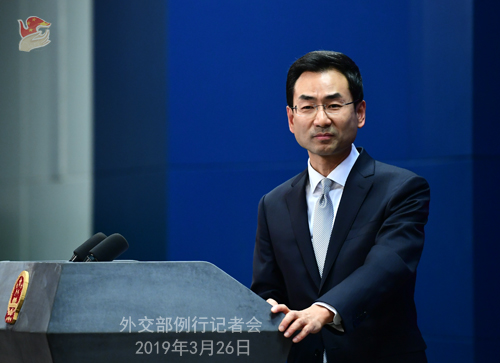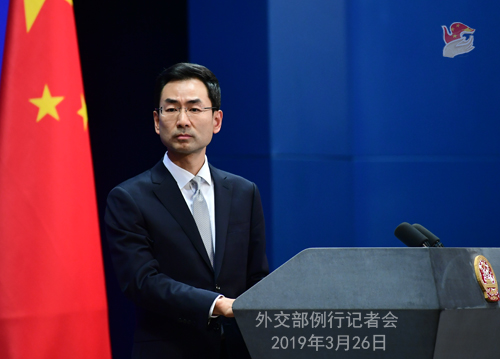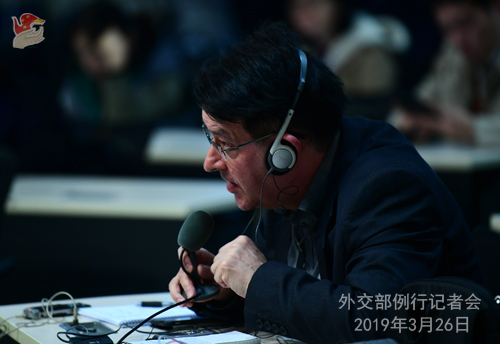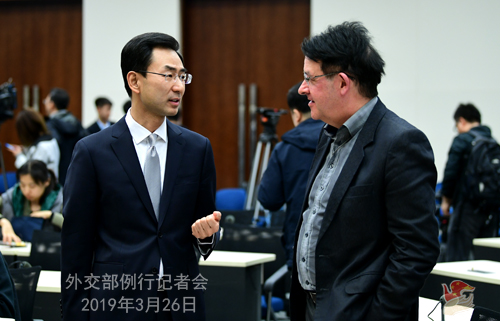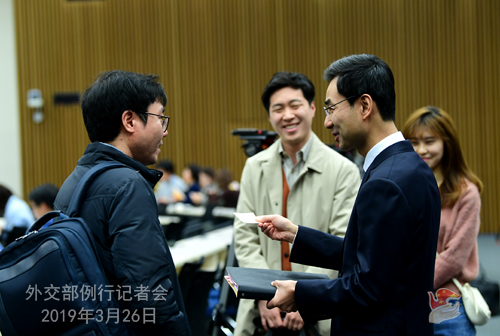| Foreign Ministry Spokesperson Geng Shuang's Regular Press Conference on March 26, 2019 |
| 2019-03-26 20:46 |
|
Q: Can you tell us about Chinese government's conversations with the government of Saudi Arabia about the two sisters who were in Hong Kong seeking asylum and have now left for a third country. Did the Saudi government ask the Chinese government to return them to Saudi Arabia? A: According to the Basic Law of the Hong Kong Special Administrative Region, the Hong Kong SAR government may apply immigration controls on entry into, stay in and departure from the Region by persons from foreign states and regions. On matters concerning foreign nationals' entry into and exit from Hong Kong, I would refer you to the Hong Kong SAR government. Q: Vice Chairman of the Workers' Party of Korea Ri Su-yong arrived in Beijing today. Will he be meeting with Chinese officials? Do you have any update on the visit to China by US Special Representative for North Korea Stephen Biegun? Are the two visits related in any way? A: On your first question, I have nothing to offer at the moment. As to the visit by US Special Representative for North Korea Stephen Biegun, I already answered a question yesterday. China maintains close communication and coordination with all parties concerned regarding the Korean Peninsula issue. We will release important information in a timely manner. Q: According to a confidential report that China and Russia issued to the United Nations Security Council Sanctions Committee, China has sent home to the DPRK a number of North Korean workers who were working in China. Can you tell us how many North Korean workers are currently in China and how many China has sent back to the DPRK? A: You said it was a confidential report. How did you get to know its content? Journalist: It was leaked to reporters. A: By whom? Journalist: I don't know. A: China is committed to faithfully and strictly implementing UN Security Council resolutions on the DPRK and to fulfilling its international obligations. For instance, China's State Administration of Foreign Experts Affairs released notices on work authorizations for DPRK nationals in an effort to implement UNSCR 2371 and 2375. In fact, China has been honoring its commitment faithfully and strictly. Not long ago, China submitted relevant report to the UNSC Sanctions Committee on North Korea.
Q: US President Trump signed on Monday a proclamation recognizing Israel's sovereignty over the Golan Heights. Many countries have already condemned this move. What's China's position on this situation? A: It is recognized by the international community that the Golan Heights is an occupied territory. The UN Security Council adopted resolutions demanding Israel's withdrawal from the Golan Heights. China objects unilateral attempts to change facts and does not hope to see escalating tension in the region. Q: Japan's education ministry today announced its authorization of school textbooks. We noticed that the elementary school textbooks clearly said that Senkaku is Japan's inherent territory. What is your comment? A: China's position on the issue of Diaoyu Island is clear and consistent. Diaoyu Island and its affiliated islands have been China's inherent territory since ancient times. The fact that Diaoyu Island belongs to China cannot be altered no matter what the Japanese side chooses to say or do. Q: The US State Department said that China systematically impedes access to Tibet, citing restrictions prohibiting diplomats, journalists and ordinary citizens from visiting. They also said that last year China rejected five out of nine US requests to visit Tibet. What's your comment on this? A: We have taken note of the report by the US State Department. The so-called US "Reciprocal Access to Tibet Act" is a serious violation of the basic norms governing international relations. It grossly interferes in China's internal affairs and sends utterly wrong signals to the separatist forces of "Tibetan Independence", severely undermining China-US exchange and cooperation. China firmly opposes that. The so-called US report based on the above-mentioned act is in total disregard of facts and full of bias. China will by no means accept it. I must emphasize that Tibetan affairs are purely China's internal affairs, where no foreign interference is allowed to meddle. China's Tibet is open to people from around the world. Considering the special geographical and climatic conditions in the region, it is necessary and indisputable that the government takes some lawful measures on the regulation and protection of foreigners regarding their entry into Tibet. We welcome more foreign citizens to visit, travel and do business in Tibet. This policy won't change. However, they must abide by Chinese laws and relevant regulations and follow necessary procedures. We urge the US to fully recognize the high sensitivity of Tibet-related issues, take concrete measures to remove the negative impact produced by the above-mentioned report, and stop using Tibet-related issues as a tool to interfere in China's internal affairs, so as to avoid damaging our bilateral relations, exchange and cooperation.
Q: Japanese Prime Minister Shinzo Abe yesterday said that Japan is ready to conduct third-party cooperation with China if the Belt and Road can meet the conditions such as openness and transparency. What is your response? A: We have noted relevant reports. The Chinese and Japanese leaders have reached important consensus on conducting third-party cooperation under the Belt and Road framework. During Prime Minister Shinzo Abe's visit last year, the first China-Japan Third-Party Market Cooperation Forum was held by the two sides where a series of concrete cooperation documents were inked. Jointly building the Belt and Road has offered a new platform for China and Japan to deepen mutually beneficial cooperation. China stands ready to work with all countries to ensure a high-quality and high-level implementation of the Belt and Road Initiative and deliver more benefits to people of all countries. Q: China's 35 billion deal to buy Airbus aircraft signed during President Xi Jinping's visit to France is about double the size that was expected. Is that a message from China to the US as your trade negotiations continue? A: As far as I know, information on the relevant deal signed by a Chinese company and Airbus to buy Airbus planes has been released by the Chinese side. It is readily available online. Over the years, China-France cooperation in aviation has been mutually beneficial and yielded fruitful outcomes. Airbus has contributed to better civil aircraft fleet and the modernization of air transport in China, while China's larger aviation industry and market have also been giving a strong boost to the growth of Airbus. Based on the development need of China's air transport industry and demand of domestic market, we will continue cooperation in aviation with relevant parties.
Q: Regarding the 60th annual meeting of the Inter-American Development Bank, which was expected to take place in Chengdu this week, do you have any new remarks or new information on this issue? Is China concerned that might raise some problems in cooperation with Latin America? A: Since you asked about the 60th Annual Meeting of the Board of Governors of the Inter-American Development Bank (IDB), I would like to offer a thorough response. As a matter of fact, I have already responded to some media inquiries on this issue. The annual meeting was originally scheduled to be held in Chengdu from March 26 to 31. Attaching great importance to this event as the host, China had done a great deal of work preparing for it. We had hoped to work with various parties to hold a successful meeting of unity, cooperation and win-win outcomes. The overwhelming majority of the IDB membership, including China, are of the view that the IDB annual meeting, as a gathering for the financial sector, should focus on financial cooperation. As such, it is hardly an appropriate venue for discussions of sensitive political issues. However, a certain country had continuously stirred up the sensitive political topic of the Venezuelan issue. While severe divisions still persist among the member states, it rushed through the approval of the new governor and executive director appointed by Juan Guaido as the meeting drew close and insisted on their participation. China's position on the Venezuelan issue is consistent and clear. We believe that all parties should abide by the purposes and principles of the UN Charter, follow international law and the basic norms governing the international relations and refrain from interfering in Venezuela's internal affairs. Although the governor nominated by Guaido has gone through the voting procedure of the IDB, Guaido himself is not a president elected through legal procedures and thus lacks legitimacy. China has difficulties allowing Guaido's representatives to attend the meeting in China. Changing Venezuela's representatives at the IDB won't help solve the Venezuelan issue and has damaged the atmosphere of the IDB annual meeting and disrupted preparations for the event. To ensure that the IDB annual meeting can be held smoothly, China had exercised prudence on the participation of the Venezuelan representatives and made reasonable proposals. We had been engaging in in-depth communication and coordination with relevant parties and calling on them to uphold the mechanism's founding mission of friendly cooperation and refrain from politicizing it. This serves the common interests of all parties. China's observations and proposals are responsible as they reflect our respect for the IDB and its members as well as our sincere hope for a successful meeting as the host. Nevertheless, a certain country has tried to impose its will on others, manipulate the Venezuelan issue and forcibly have Juan Guaido's representatives participate in the meeting in disregard of the meeting's purpose, China's position and concerns and our sincere efforts as the host. What it has done eventually led to the cancellation of the meeting. This is the last thing any party would like to see, and the responsibility does not lie with the Chinese side. China deeply regrets that the IDB decided to call off its annual meeting in Chengdu. To my knowledge, the vast majority of the IDB membership agree with China's view that the annual meeting should focus on financial cooperation and not be disrupted by contentious political issues. And it is only too evident which country was thwarting efforts for a successful meeting. We are confident that China's cooperation with Latin American and the Caribbean countries will not be disrupted and we have every confidence in the brighter prospects of future cooperation. Q: Yesterday, US National Security Adviser John Bolton commented on the situation in Venezuela and said that the United States will not tolerate any interference by hostile foreign powers into the Western Hemisphere's affairs. I was wondering what's China's opinion about this kind of comments? A: First of all, countries in the western hemisphere, including Latin American countries, are all independent and sovereign states. They have the right to determine their own foreign policy and their way to engage in mutually beneficial cooperation with countries of their own choosing. Second, it is China's consistent position to develop friendly and cooperative ties with all countries, including Venezuela and other Latin American countries, on the basis of the Five Principles of Peaceful Coexistence. Regarding the Venezuela issue, we want to stress that it can only be resolved by the Venezuelan people, and stability is in the interests of Venezuela and the region. China would like to work with the international community to help Venezuela restore stability at an early date. Meanwhile, we will continue to advance friendly and mutually beneficial cooperation with Latin American countries. Latin American affairs are not a certain country's exclusive business, nor is Latin America a certain country's backyard.
|
 |
|
